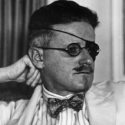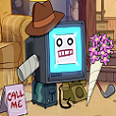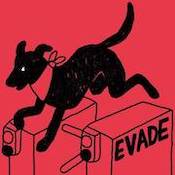|
I laughed really hard. It's true though. A well-lived and well-examined life of real experiences is the cornerstone of any artistic education.
|
|
|
|

|
| # ? May 11, 2024 14:30 |
|
SkySteak posted:To be brutally honest though, in the end a lot of good writing comes from inherent talent. You can practice all you want but if you don't have the ability, no matter what effort you put in, you'll just be 'alrigh't at best. And if you have all the ability in the world and no effort you still don't have a book. Take three ideas. Flesh them out. Enhance the characters, aim them at the first fork in the plot. Start writing a chapter one. The one you get to the end of and start chapter two is the one you should be working on right now. When you need a break, play with the next one. Total despair over how much or how little talent you have will recur throughout your career, you may as well get a book out of it.
|
|
|
|
Stuporstar posted:Here, I'm gonna demystify talent for you. Talent, when it comes to art, is an innate ability to connect with an audience. Sitting all by yourself writing like crazy and never getting out of the house will never get you there, because you learn how to connect with people by interacting with them. There. That's the magical "talent" that makes people go, "Wow, this work really speaks to me." If you get people, you write relatable characters. If you write relatable characters, people think you have talent. So why is talent so hard to come by? Because too many writers are NERDS. Man I've said this about six different times in this thread but not as directly as you are, now-- so thank you for that. It really is the singularly most important truth to learn about writing, and really all art intended for consumption by anyone other than the artist themselves.
|
|
|
|
SkySteak posted:To be brutally honest though, in the end a lot of good writing comes from inherent talent. You can practice all you want but if you don't have the ability, no matter what effort you put in, you'll just be 'alrigh't at best. Inherent talent is really nothing but an artificial crutch. There's really nothing mystical or special about talent other than the people with talent worked their asses off in an effort to find their talent. Why, you ask, do some authors spring out of the aeather with a generation defining work? Where did it come from? Well. The truth is behind that genius novel or work is millions of words of crap that will never see the light of day. It also comes down to taste. You are what you eat and you write what you read. A writer with good taste is constantly trying to write to whatever ideal they've created in their head for "good" whereas the writer who reads nothing but star wars novels can probably attain his ideal after a few months of feverish fan fiction writing. Again taste is a big part of talent. And in the end if you think you've got talent, write a short story or a novel and end up having it rejected and then give up forever, well that other guy who just kept writing and ignoring people who told him he didn't have any talent will get published and have the last laugh. End ramble.
|
|
|
|
I'm gonna qualify my last post by saying I've identified three core things that you need not to suck: Love of your chosen medium. Like the "I find fiction revolting" girl is just no hope. This is what often gets called talent in kids. If a kid loves drawing, they keep doing it until they're better than their peers, but they need the next two things to go beyond that. Self awareness—critical faculties. If you're lacking this, you end up like that Major Tom guy on TVT who's written a million words of crappy Gundum fanfic or whatever, never does so much as a minor proofread, and proceeds to write another million words of crap. Experience—not just writing experience, but life experience and a shitload of reading. When some kid strolls in CC saying, "I want to make anime" and proceeds to post reams of crappy animu drawings and a comic script with wooden characters ripped straight out of Sailor Moon, this is what they're lacking—and this is exactly what HiddenGecko is talking about. Garbage in = garbage out.
|
|
|
|
Stuporstar posted:I'm gonna qualify my last post by saying I've identified three core things that you need not to suck: This is all excellent. It might be a good thing to edit into the OP.
|
|
|
|
Thank you, Fiction thread. I have gotten off my rear end and started submitting for the first time in a decade. Well, it's either this thread or the fact that someone from high school's been published recently and I do nearly everything I do in life out of spite, hate and jealousy. So, how does everyone decide what journals they pitch their work to- especially if one doesn't write a genre?
|
|
|
|
At just over 32,000 words, my first novel is making great progress and the first draft is far better than I expected my first draft to be. If I can maintain this level of work, editing should be a tremendously painful process of cutting and dicing my work to make it better. I took a short break from that project today and put together a short children's book for a close friend's kids. They're getting a puppy for Christmas and now they'll get a puppy AND a book written just for them with illustrations of them with their new dog. I'm pretty excited to get the sketches back from my illustrator and get my first ever (self)published work completed. I'm ridiculously excited and wanted to share with all of you fine folks. Once I get a first draft completed and edited, I'll post a threat with an excerpt from my novel to get thoughts.
|
|
|
|
SrgMagnum posted:I'm pretty excited to get the sketches back from my illustrator and get my first ever (self)published work completed. That's awesome. I'm not sure it's not better to do it that way when it's a personal gift. Especially since no other kids will have that dog either, it limits your audience.
|
|
|
|
Rose Wreck posted:That's awesome. I'm not sure it's not better to do it that way when it's a personal gift. Especially since no other kids will have that dog either, it limits your audience. Yea, this is my first attempt at children's stuff so if my buddy's 6 and 3 year old like it, I'll offer it up to other friends as a fun little hobby. Maybe I'll get paid for my work sooner rather than later! It's also a great little brain break for when working on the big, adult stuff gets a little overwhelming. The thought of seeing a professional's interpretation of my writing is pretty awesome, even if I didn't actually create any characters for this one. I really can't wait.
|
|
|
|
Molly Bloom posted:
Oh god I`m so glad someone else said this. Nothing motivates me like seeing someone else I know be successful. Especially if it`s someone I know I`m better than. It is not enough for me to succeed, others must fail.
|
|
|
|
So my illustrator wasn't quite what I was expecting and gave me a quick crash course on how a professional illustrator typically does a children's book. Apparently there are usually 6-12 months simply for concept art! Obviously I don't need anything near that level of depth into this thing but I would like some good, cartoony illustrations so now I'm off to search for a friend of a friend or some random guy who's willing to work up about 17 illustrations with some sort of expediency. Hopefully I'll find someone who can do decent work without killing my limited funds in a reasonable time frame. My dreams are on hold for another few weeks. Bummer! Hope everyone's Christmas is spectacular.
|
|
|
|
Just something to add to the talent vs. practice discussion: an interesting video on what is creativity https://www.youtube.com/watch?v=VShmtsLhkQg Basically, practice is what makes the masters of their craft, along with taking the time to work on creative things, working with others, etc. "Talent", as the way it's usually described, becomes a nice excuse for not doing something or explaining why you don't feel you're good at it. Real "talent" is just liking something and having the balls to do it, and then you do it enough that other people like it, too. That said, I just read some McCarthy that lit a fire under my rear end to really work on my writing (and feel that I totally suck and will never be as good and what am I doing aaaaaaaaa). Does any one else have any writers that they admire/inspire them, or have any suggestions of books that teach great craft in practice (subjective, I know)?
|
|
|
|
yoyomama posted:That said, I just read some McCarthy that lit a fire under my rear end to really work on my writing (and feel that I totally suck and will never be as good and what am I doing aaaaaaaaa). Does any one else have any writers that they admire/inspire them, or have any suggestions of books that teach great craft in practice (subjective, I know)? Super subjective. I think a good way to keep yourself inspired or at least thirsty for better writing is literary magazines. they feature stuff that is very contemporary and of the moment. You like literary fiction? Well it only costs a few dollars a month for a kindle subscription to a few things like glimmer train or the like. The same holds for most other literary mags. They'll often feature the current rock stars of fiction, the new guys, the raw stuff that you can't find in Barnes and Noble. Basically always be trying to read something new that you've never exposed yourself to before. Personally that's how I read and learn the most effectively. You can't settle for just reading one author or two in a genre you like. You have to branch out as far as possible and read everything. You don't like twilight? Well read it and decide why you dislike it. You like horror? Start with Stephen King and work your way through the schlock until you find a horror writer that just clicks with you. You know how if you're in an art museum and you see people copying other artists on a sketch pad? You need to be doing the same thing as a writer, eventually you'll arrive at your own voice but in the interim you need to work your way up to that. And the only way to achieve that is to read stuff outside of your comfort zone.
|
|
|
|
HiddenGecko posted:Super subjective. I think a good way to keep yourself inspired or at least thirsty for better writing is literary magazines. they feature stuff that is very contemporary and of the moment. You like literary fiction? Well it only costs a few dollars a month for a kindle subscription to a few things like glimmer train or the like. The same holds for most other literary mags. They'll often feature the current rock stars of fiction, the new guys, the raw stuff that you can't find in Barnes and Noble. Totally agree, I got my copies of The Paris Review and Tin House right here. Tin House is another big push for me. The writing in Tin House is like that cool kid in high school I wished I could be and thought was the best ever, that's the only way I can explain it. quote:Basically always be trying to read something new that you've never exposed yourself to before. Personally that's how I read and learn the most effectively. You can't settle for just reading one author or two in a genre you like. You have to branch out as far as possible and read everything. You don't like twilight? Well read it and decide why you dislike it. You like horror? Start with Stephen King and work your way through the schlock until you find a horror writer that just clicks with you. You know how if you're in an art museum and you see people copying other artists on a sketch pad? You need to be doing the same thing as a writer, eventually you'll arrive at your own voice but in the interim you need to work your way up to that. And the only way to achieve that is to read stuff outside of your comfort zone. I agree with this, too. Branching out helps you to find your voice, and finding good books is always fun. I've found it helps to read the Paris Review interviews to find new writers that I would have never otherwise considered reading (and also inspiration). Their blog also sometimes posts about writers or books/book lists that help me to find new stuff. An interesting point about the artists that copy masterworks in museums. I wonder if the same thing would work for writing. Not just reading and then incorporating what you learn in your own work, but direct emulation. For example, a teacher in 5th grade once had us read e e cummings and then write our own poems in his style. I made a fuckton of poems just loving around with the way words were positioned, super-derivative copying of what we read, but I really feel like it's one of the big reasons I still write poetry today. Getting a chance to "practice" was a nice way to just enjoy the act of doing it and understand what was being done in the poems and gave me a template that made it easier to think of something to say. I don't know how much direct copying would help learning about writing, but I'm thinking that if one was engaged enough, even literally re-writing the words of a book or re-writing a plot would help one to learn in some way.
|
|
|
|
Sitting down and actively copying a short story into your word processor can actually be really helpful. If you're a wicked-fast typist like me, you may be used to zoning out and having no clue of what you're typing from a sheet of paper onto the screen, thus defeating the exercise. However, if you take your time and actively type it out, you can learn a lot about multiple aspects of a story: rhythm, phrasing, realistic dialogue, and more. I'd suggest actually reading it out loud and then typing it.
|
|
|
|
Whenever I draw, I keep open books or tabs up of art that inspires me and which is a style that I want to flavor my work. When I write, I'll have a small stack of books nearby for the same "flavoring" purpose. Carefully reading through someone else's work gets my brain into the rhythm of their voice, and I often find this helps me carry beneficial aspects of a style I admire into my own writing. Of course, the stack of books changes depending on what I'm doing - maybe Elmore Leonard for focusing on dialogue, for example, though I find transcripts and great screenplays are great for that as well. It's an ever-rotating list as I discover more writers, distinct voices, and create new goals for myself. My favorite reference books are Jonathan Strange & Mr Norrell by Susanna Clarke and Cold Mountain by Charles Frazier. I can crack them open anywhere to find great descriptions that alternate between wry, quiet humor and shocking beauty.
|
|
|
|
So, can anyone tell me how a guy (me) tries for years and years to write and novel and never manages? I've tried outlining and never can make the outline consistent and tight enough, and I've tried not outlining and always quit at a few thousand words because I just can't see anyone entertained by that. I've just introduced myself to Neil Gaiman and I'm feeling pretty bummed because I'm not getting any younger.
|
|
|
|
Have you tried writing shorts? Sometimes a whole novel is just too daunting and you can't focus long enough to finish it. Try writing short fiction so you get the feel and practice of writing a self-contained story but in far less time and space. I know I always plug Thunderdome, but I've never seen you here before so I'll say it again. Come join us there and write some easy 1000 words or less flash fiction, get some story ideas outta your system. 
|
|
|
|
If you can't get through more than a few thousand words at a time, write short stories instead. Developing your skills will help you when you embark on a novel later, or maybe you'll discover you don't need to write a novel to say what you want or tell the stories you want. Jorge Luis Borges was one of the major writers of the last century and never wrote so much as a novella. e: beaten so I'll add that I think a lot of people get hung up on writing 'a novel' because it's the standard form for professional written fiction in our society, and this burns them out because it's a huge amount of work, especially for a new writer. Peel fucked around with this message at 02:07 on Dec 26, 2012 |
|
|
|
Martello posted:I know I always plug Thunderdome, but I've never seen you here before so I'll say it again. Come join us there and write some easy 1000 words or less flash fiction, get some story ideas outta your system. Oh, I always get turned away by the bouncer. Peel posted:If you can't get through more than a few thousand words at a time, write short stories instead. Developing your skills will help you when you embark on a novel later, or maybe you'll discover you don't need to write a novel to say what you want or tell the stories you want. Maybe I also read only novels, come to think of it. But, well... novels are engrossing, no? I mean you can only read through the night with a novel, right? And that's what I like to do, so if I write what I like... On the other hand, normally I read while I commute, and whether it's fun to read would be more important than its overall length. It's just that I've abandoned so many excellent (I think) ideas, for a variety of reasons, not least of which being that I thought I just couldn't make them work out. And everyone else's ideas keep working out, as in, a friend won NaNoWriMo this year with 100k. Fuckin' winners. (For the record, I didn't participate this year because I had begun my latest attempt at a novel before November.)
|
|
|
|
I'm an idiot.
Erik Shawn-Bohner fucked around with this message at 18:42 on Dec 26, 2012 |
|
|
|
supermikhail posted:And everyone else's ideas keep working out, as in, a friend won NaNoWriMo this year with 100k. Fuckin' winners. (For the record, I didn't participate this year because I had begun my latest attempt at a novel before November.) Before you consider whether they have "won" I would suggest you read their 100k output and reconsider. Most novels from that month are barely edited rush jobs and padded with words just to reach the target word count which is not the way for novels to be written.
|
|
|
|
The Saddest Rhino posted:Before you consider whether they have "won" I would suggest you read their 100k output and reconsider. Hm. That's an idea. supermikhail fucked around with this message at 22:11 on Dec 26, 2012 |
|
|
|
Ooops. Hit alt-tab and thought this was the other thread. Sorry for the threadshit guys.
|
|
|
|
supermikhail posted:So, can anyone tell me how a guy (me) tries for years and years to write and novel and never manages? I've tried outlining and never can make the outline consistent and tight enough, and I've tried not outlining and always quit at a few thousand words because I just can't see anyone entertained by that. I've just introduced myself to Neil Gaiman and I'm feeling pretty bummed because I'm not getting any younger. Neil himself has a few words about this. With regards to outlining, it's good to have a knowledgeable friend you can bounce ideas off of. I may be lucky in that my best friend and roommate basically serves as my de facto editor, but we have a board with index cards on the wall in my room and we'll stand around smoking and drinking, rearranging and pitching ideas, sticking stuff to the wall and taking it off. Don't feel so rigid about the drafting process, just have fun with it.
|
|
|
|
supermikhail posted:Oh, I always get turned away by the bouncer. Not really. It might help or it might not; if it's not your thing, there's other ways to get your feet wet. As for the problem you're describing, it could be lots of things; I'm gonna break it down a little bit. How much revising do you expect to do? It sounds like you are expecting to, like, lay a novel like an egg. Would it help to plan on the first thing you create being a first draft? I find plot is organic and sometimes I have something tightly knitted, sometimes I have several vaguer threads I work towards until I have the groundwork for something that ties together. How certain are you what, exactly, the story you want to tell is? Have you hit a starting point where you can run with it, or do you do a lot of setting up for the interesting part and then give up? How much time are you spending developing your characters? I recite "plot is character driven" as much as some people advise "show, don't tell," and I'm sure it's just as irritating, but it's important: if your character doesn't have some emotional resonance, it's easier to feel too removed from his or her story and just walk away. Have there been any characters who take on a life of their own? Is there a way you could tell the story from their perspective instead? If there has never been one, you may need to take a break from plot and develop character pieces. Have you tried writing a short story or a novella?
|
|
|
|
yoyomama posted:An interesting point about the artists that copy masterworks in museums. I wonder if the same thing would work for writing. Not just reading and then incorporating what you learn in your own work, but direct emulation. For example, a teacher in 5th grade once had us read e e cummings and then write our own poems in his style. I made a fuckton of poems just loving around with the way words were positioned, super-derivative copying of what we read, but I really feel like it's one of the big reasons I still write poetry today. Getting a chance to "practice" was a nice way to just enjoy the act of doing it and understand what was being done in the poems and gave me a template that made it easier to think of something to say. I don't know how much direct copying would help learning about writing, but I'm thinking that if one was engaged enough, even literally re-writing the words of a book or re-writing a plot would help one to learn in some way. I believe it's actually a good way to develop your own style, or to move out of your comfort zone once you realize that you keep repeating yourself. When one emulates always borrows more than what actually wants to retain, so what is found useful from a particular write is kept and everything else is discarded. With each consecutive emulation a writer slowly builds up a toolbox. I think that one does have anyway be careful of the following: 1) Choose exceptionally good writers. 2) Understand the difference between emulating them stylistically and thematically. The later is useless. If you are trying to copy Dostoevsky and all you do is simply put two characters in a room speaking about the orthodox church you are not really getting anywhere. You have to study the work, understand how it breathes and grows. Wear its skin in the same way an actor imitating a famous person would. 3) Don't get stuck on anyone for too long. You are not trying to become that author and you can only learn from anyone to a certain limit depending on your propensity. Don't become Pierre Menard author of the Quixote.
|
|
|
|
A creative writing prof I know actually advised against reading and emulating authors with a really strong, distinct style like James Joyce and such, since you will just get overwhelmed by it and never develop your own style. He said one of his writing buddies was basically ruined by reading Hemingway, since everything he wrote afterwards was just Hemingway, and the guy never really got his own voice. To me that sounds kinda dumb, but that prof is wicked smart so I try to keep it in mind. Chexoid fucked around with this message at 08:26 on Dec 27, 2012 |
|
|
|
FauxCyclops posted:Neil himself has a few words about this. The thing I took away from that piece is that he sounds like one determined mother. I used to feel very sad that I don't have anyone to bounce ideas off. Then I got over it. Rose Wreck posted:Not really. It might help or it might not; if it's not your thing, there's other ways to get your feet wet. So, my nonfunctional approach. I can't say how much revising I expect to do, but I can say that I've written several short stories and with them revising has been almost purely cosmetic, that is, change a couple words here and there. I've spend the last year trying to create a first draft, and somewhere along the road it inevitably falls apart. Maybe I should for a change try to meticulously craft a story from the ground up again. Generally, I start with an awesome idea. Time passes and it snowballs (ideas usually include character ideas). And then I stop being certain which idea is the Idea. Last spring, though, I ditched all my really old plots with lots of baggage. It's worked out in the sense that I managed to write a short story in which the mood sharply changes mid-story. I probably should have done some outlining. I would say I normally start with an interesting part, and then I don't know what to write about except that I have an impression that really awesome stuff should come later on and now is a transition which I'm not sure what to fill with. Like, a band of adventureres have met, received their quest and are traveling to their destination. And then it turns out they don't have anything interesting to talk about, and no conflicts. The terrible thing is that they could have conflicts, but I want to avoid cliche at all costs. I can't say I've ever felt a character take on a life of his/her own. I would say most of the time plot just happens to them. Except that time when I didn't have a plot and the character was particularly crazy. But I have never felt like a character was a living person invading my artistic license.
|
|
|
|
The Saddest Rhino posted:Before you consider whether they have "won" I would suggest you read their 100k output and reconsider. Most novels from that month are barely edited rush jobs and padded with words just to reach the target word count which is not the way for novels to be written. As a 'winner' of nanowrimo I can attest to everything in this post being true. Nanowrimo was a hell of a thing to get me actually writing but the output is...barebones at best. Less 'workable' more 'needing a severe rewrite from the ground up' 50,000 in a month is still feasible, in my opinion. If you have a solid foundation and ideas and aren't just writing to pad up word count for the sake of 'winning' at least.
|
|
|
|
supermikhail posted:I would say I normally start with an interesting part, and then I don't know what to write about except that I have an impression that really awesome stuff should come later on and now is a transition which I'm not sure what to fill with. Like, a band of adventureres have met, received their quest and are traveling to their destination. And then it turns out they don't have anything interesting to talk about, and no conflicts. The terrible thing is that they could have conflicts, but I want to avoid cliche at all costs. I think I may have found your problem. Write a series of interesting things and use a transition as bare-bones as you need to set up the next interesting thing. That space is usually where you'd put characterization, kick off subplots, deliver background, or set up the plot. Do whichever keeps it rolling. If you have to, write the next interesting thing and then go to the last place you were and fill in with setup to the first action-resuming paragraph. As for your characters... it does sound like you need to flesh them out, because characters being themselves may be cliche but it's true. A pair of four-year-olds will not stop fighting over a toy just because four-year-olds have done that since the advent of toys, they will scream and kick and wrench at the toy. If a conflict turns out to be present in the characters you've written, at least have them be snide about working together until their mission is done and they can have it out. I'm not talking about, like, mental illness, I'm talking about the giddiness of having developed a character that was meant to take a minor role but turns to have enough interest, perspective, or personality that you just can't quit writing them.
|
|
|
|
Chexoid posted:A creative writing prof I know actually advised against reading and emulating authors with a really strong, distinct style like James Joyce and such, since you will just get overwhelmed by it and never develop your own style. I tend to find this idea suspect. For a series of reason. First of all because I believe that for a writer finding a personal and powerful voice is like hitting the jackpot for a writer, and this means something that won't happen for the majority of people. I wonder why he didn't advise his writing buddy to emulate someone completely different like Thomas Mann. Actually Hemingway + Mann would have been hilarious. Proust, who was an author who worked a lot through emulation, advised something similar to a friend of his who was too stuck on the decadents: read Shakespeare and Goethe.
|
|
|
|
supermikhail posted:I can't say I've ever felt a character take on a life of his/her own. I would say most of the time plot just happens to them. Except that time when I didn't have a plot and the character was particularly crazy. But I have never felt like a character was a living person invading my artistic license. I usually try to avoid conversations about super subjective stuff like this, but I zeroed in on this quote because it touches on something I think is really critical for writing engaging fiction. I'm in the camp that believes that the characters you create should take on a life of their own at some point early-ish in the creative process. They should have their own opinions, desires, motivations and so on within the context of the world you're creating. If they don't, then nobody will care about what happens to them, which is essentially fatal to your reader's interest. Often, if you're having issues writing engaging characters, it's probably because you're simply rushing to have a vague "hero" going on some kind of vague "quest" and who will be opposed by some vague "villain" etc and so forth. That's throwaway fanfic level of writing and will endear you to literally no one but the most ardent consumer of that particular genre. What kind of characters do you enjoy reading about? Why? What makes them compelling to you? Are you certain that you know a compelling character when you see one? If you're not, that's absolutely your biggest and most urgent problem. Chillmatic fucked around with this message at 15:13 on Dec 27, 2012 |
|
|
|
Okay, I can say that my minor characters always become bigger than intended because outlining is hard and as a result things and characters happen just because the plot stumbled over something/someone in a logical place, if that makes sense. I guess a more fair treatment of my previous example would be "and are traveling to their destination. And then a completely random thing happens which purports to have some relevance to later events but doesn't have any yet." ...Yeah, screw novels. I don't think I'm ready to invest so much emotion for such a remote chance of return any time soon again. But you won't see me in Thunderdrome because 1000 words seems too short for my kind of awesome idea. Chillmatic posted:What kind of characters do you enjoy reading about? Why? What makes them compelling to you? I wouldn't say my protagonists are ever close to being heroes. For me realism is the most important character trait, and I wouldn't say my characters are cardboard cutouts. I try to start them with a reasonable amount of "handicaps". I'm having trouble answering your questions. I enjoy reading good fiction, and normally read good fiction. I guess it comes with good characters, although I can't say what's special about them. Or maybe I can. The best characters sort of are cardboard cutouts, because they usually have a grand total of about three traits that define their personality completely. Is that it? I try to give my characters motivations, but I let them go about them too gradually, I think. Good thing I can't afford any hesitation in the short form.
|
|
|
|
supermikhail posted:I wouldn't say my protagonists are ever close to being heroes. For me realism is the most important character trait, and I wouldn't say my characters are cardboard cutouts. I try to start them with a reasonable amount of "handicaps". Alright look dude-- Most actual writers don't usually have patience for this kind of stupid bullshit hand-holding, and you've just about exhausted mine already. You're literally telling me that you enjoy reading good fiction, but that those characters really aren't all that great (because they're "cardboard cutouts"--what the poo poo?), and that you do the exact opposite of that in your own writing by creating "unique" characters with a bunch of ill-defined traits that don't even loving interest you, the author? I mean really now; what in the actual hell is any of us supposed to say to that? That you're a genius because you refuse to write "cardboard cutout" characters? (and apparently by "cardboard cutout", you mean the kind of characters found in successful books that people actually like to read.) That you've got it all figured out? Just going off of the sadsack bullshit you're posting here, my recommendation is to pull your head out of your rear end and realize that successful fiction works for a reason, and it ain't because the characters are bland and one-dimensional. Those authors understand something you clearly have no comprehension of whatsoever. When you're willing to examine yourself and accept some realities, you'll have much better luck when soliciting advice. Chillmatic fucked around with this message at 17:14 on Dec 27, 2012 |
|
|
|
supermikhail posted:But you won't see me in Thunderdrome because 1000 words seems too short for my kind of awesome idea. Sorry dude, but this is a really dumb thing to say. You're not a published famous writer, referring to your ideas as "too awesome for 1000 words" just makes you sound like a self-important new writer who doesn't know what he's talking about. I didn't invent the concept of flash fiction for Thunderdome. It's a thing and it exists and it's a good thing. Give it a shot before you say you're too good for it. Then take one of your finished, completed flash fiction pieces and make it into something longer, say 4000-10,000 words. That's the kind of short piece you want to send to a magazine. Even if you don't make a flash piece into something longer, the practice of writing a story with a beginning, middle, and end can't possibly be anything but a good thing for you. supermikhail posted:I wouldn't say my protagonists are ever close to being heroes. For me realism is the most important character trait, and I wouldn't say my characters are cardboard cutouts. I try to start them with a reasonable amount of "handicaps". What the gently caress are you talking about here? You used the term "character trait" and "handicap." Do you think writing fiction is like making Dungeons & Dragons characters? My extrapolation here is that you think of your characters in terms of constituent parts and maybe even (god forbid) "power levels" that need to be handicapped. Your characters should be living, breathing human beings (or aliens or robots or pirates or whatever you like to write) that just so happen to inhabit the pages of your fiction instead of the real world. I'd really like to see what your character development process is, because if it looks like this I'm going to cry: "Well, Bobby Ray Phillips is really really good at shooting pistols and throwing knives, and is very charismatic, but I don't want him to be a Mary Sue so I'm gonna also give him bad BO and make him bald and bad at math." And then there's that other part that I bolded, which I'll quote again just for emphasis: "The best characters sort of are cardboard cutouts."  Seriously dude? This is actually what you think? Please give me some examples so I can tell you why you couldn't be more wrong.
|
|
|
|
Sheeeet. I could say that my previous reply should be taken in places ironically, and instead was taken the wrong way, but I'm not sure I'd be able to unravel this mess. I guess I should say that Thunderdome is awesome, but I've got my own process which hasn't involved other people much so far, and I prefer it that way. Plus I've recently gotten into the habit of overthinking my replies greatly, which may have affected their quality rather contrarily to my intentions. I hope I'm not so terrible a jerk as my recent interactions on the Internet seem to indicate. Sheesh. Anyway, thanks for your comments, I've taken them to heart more than I let on.
|
|
|
|
supermikhail posted:but I've got my own process which hasn't involved other people much so far, and I prefer it that way. Are you writing a diary or something?
|
|
|
|

|
| # ? May 11, 2024 14:30 |
|
supermikhail posted:Sheeeet. I could say that my previous reply should be taken in places ironically If your characters fail to come across in the same way your "irony" failed to come across, then it's little wonder that you're struggling to write interesting and engaging material. quote:I've got my own process which hasn't involved other people much so far, and I prefer it that way. Oh well in that case I guess your writing is already totally great and that you don't need to be asking strangers on the internet for help or encouragement!
|
|
|

















